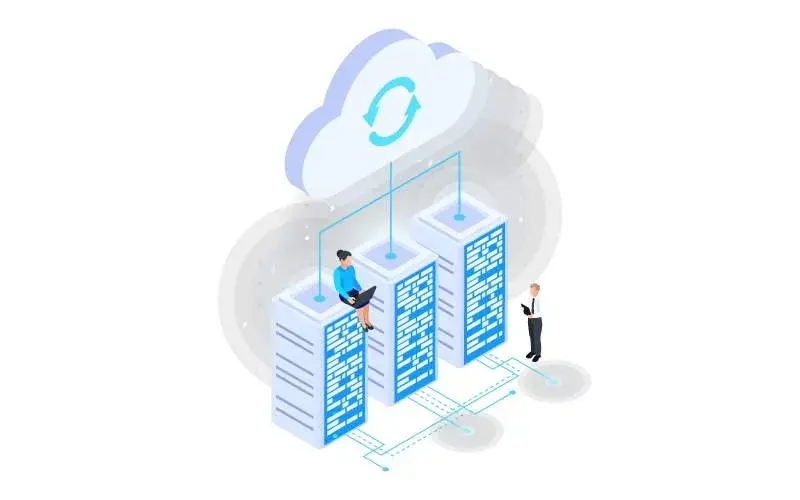In recent times, many businesses have moved into the “cloud” and have reaped the many benefits offered by this new technology. The term cloud infrastructure applies to the physical and virtual components and services that are needed to build, deploy, and run software, applications and services over the internet. These are generally used by companies that create cloud-based applications and software. Cloud infrastructure management services are generally offered by a cloud service provider or third-party service provider, and are customisable according to a business’s needs and requirements. They assist these development companies to manage and maintain the applications they have created, leaving more resources and time for the business to allocate to more important tasks.
A cloud infrastructure typically includes the following (more details can be found via the following link https://www.vmware.com/topics/glossary/content/cloud-infrastructure-management.html):
- Servers: Physical or virtual servers that are used to both run applications and store data.
- Storage: Disk space for storing data.
- Networking: The virtual and physical infrastructure that is needed to transmit data between servers, storage systems, and users.
- Management tools: Software and tools for managing and monitoring the cloud infrastructure, as well as the application.
- Security: Technologies and processes for protecting data and privacy in order to ensure a secure experience for users.
Cloud infrastructure offers valuable benefits to businesses as they are highly scalable, flexible, and a cost-effective way for businesses to run software, applications and services without having to pay for and maintain expensive hardware and software, which is why many companies are now considering migrating to the cloud.
What is cloud infrastructure management?
Cloud infrastructure management refers to the processes, tools, and techniques used to manage and operate cloud computing environments, which may include the following:
- Provisioning and configuring Resources: Setting up configuring the new resources as needed in terms of hardware and software requirements, such as virtual machines, storage systems, servers and network connections etc.
- Visibility and monitoring Performance: Monitoring and tracking the performance of a business’s cloud resources, and identifying and addressing any issues as and when they come up. These services may also include real-time alerts and notifications which help in detecting issues quickly and efficiently.
- Resource allocation: Dividing up the resources among the users and allowing for certain contingencies as and when needed, allowing greater control.
- Scaling: As business needs change, so will the resources that are needed. Adding or removing resources as required by the business to meet changing demands, and ensuring that the cloud infrastructure is always optimised for performance and cost.
- Maintenance: Keeping the cloud infrastructure up-to-date with security patches, software updates, and other maintenance tasks to ensure a smooth operation at all times.
- Cost optimisation: Cost is an important aspect for any business. Minimising the cost of using these resources is a part of the management services provided. These models generally offer a pay-as-you-go structure, which makes it extremely cost-effective, especially for small and medium businesses that do not have extensive resources. If these resources are not managed properly the business may find themselves paying far more than they initially anticipated.
Cloud infrastructure management can be performed by the cloud service provider or by the customer, depending on the specific cloud services being used. Effective and efficient management of your cloud infrastructure is critical for ensuring the reliability, security, and performance of cloud environments, and for controlling costs and optimising the use of resources. Without proper management of these resources, a business may not be able to make use of the benefits offered by this model, which is why many companies tend to outsource their needs to third-party providers. Outsourcing such services will help businesses to focus on more important aspects of their operations, rather than spending time and resources on complex tasks.
 https://www.freepik.com/free-vector/_23128858.htm
https://www.freepik.com/free-vector/_23128858.htm
What are the different cloud infrastructure management services available for businesses?
There are many different cloud infrastructure management services available for businesses that want to benefit from this technology. They typically include services that address the creation, configuring, scaling and retiring of resources, as and when needed by the business. These services are offered by professional companies like Sanmark Solutions, for those businesses that do not have the resources nor the time to manage such complex processes.
The services offered by such companies include:
- Computing services: Managing and maintaining cloud-based resources such as virtual desktops, dedicated or virtual servers and other aspects of your infrastructure to ensure a smooth operation at all times, without any issues or problems.
- Storage services: These services provide a variety of storage options to meet the needs of different types of applications. Ensuring your dedicated or virtual servers are well maintained and monitored at all times for more enhanced operations is part of this service.
- Networking services: These services provide virtual networks, load balancers, and other networking capabilities needed to connect and manage cloud resources. This ensures that your infrastructure is well maintained at all times for hassle-free operations.
- Monitoring: These services provide tools for monitoring the performance of cloud resources, as well as providing logs and metrics that can be used for debugging and troubleshooting.
- Security and compliance services: These services help organisations secure their cloud environments and comply with regulations and standards.
- Backup and recovery services: These services provide a way to backup and recover data and applications in the event of data loss or any other disaster that could happen. These types of services may be provided on an ad-hoc basis, as and when needed.
- Cost optimisation services: These services provide tools and strategies for reducing the cost of using cloud resources, including cost allocation, cost reporting, and optimisation of resource usage, which offer these businesses a cost-effective approach.
These are just a few of the many cloud infrastructure management services that are available to businesses looking to outsource them. The specific services used will depend on the specific requirements of the organisation, the type of applications being run, and the cloud service provider being used. Since there are many options available to businesses, it is important to make a decision with regard to these services and who the service provider you use is, in order to get the maximum benefit.
How do cloud infrastructure management services help a business?
These types of services can help businesses in many ways, including:
- Enhanced collaboration: Team members from around the world can collaborate and work on projects enhancing communication between team members, efficiency and productivity.
- Streamlined Operations: By automating many of the routine tasks involved in cloud infrastructure management, businesses can simplify and streamline their operations, reducing the need for manual intervention and freeing up time for more strategic initiatives.
- Remote workforce management: Team members can work from anywhere at any time, which is beneficial for those companies that are using remote or hybrid work methods.
- Improved Resource Utilisation: These services can help organisations optimise their use of cloud resources, ensuring that they are used efficiently and cost-effectively, and reducing waste.
- Better Visibility and Control: With such services, businesses can gain a more complete understanding of their cloud environments, including resource utilisation, performance, and costs, and use this information to make more informed decisions about resource allocation and management.
- Enhanced Security and Compliance: By using these services, organisations can improve the security of their cloud environments, reducing the risk of data breaches and other security threats, and ensuring compliance with regulations and standards.
- Improved Resilience and Business Continuity: With disaster recovery and backup services, businesses can ensure that their applications and data are protected in the event of a disaster, helping to minimise downtime and ensure business continuity.
- Increased Agility and Scalability: By automating many of the routine tasks involved in cloud infrastructure management, organisations can quickly and easily provision, scale, and manage cloud resources as needed, enabling them to respond to changing business demands and market conditions.
- Access to the latest technologies and innovations: Small businesses with limited resources will have access to the latest technologies without the additional expense.
- Lower total cost: By optimising the use of cloud resources and reducing the costs associated with manual management and administration, businesses can lower their overall total costs and increase their return on investment (ROI). Expensive hardware and software costs can be minimised, as are costly upgrades.
These are just a few of the many ways in which cloud infrastructure management services can help a business (you can find more information on the following resource https://squashapps.com/blog/cloud-infrastructure-management-services/). By leveraging these services, organisations can optimise their cloud environments, reduce costs, improve reliability and security, and achieve a competitive advantage in their markets.
If you have just launched your new software or application and are looking for cloud infrastructure management services, then you need to get in touch with Sanmark Solutions. We have the right expertise and experience to offer you the best services at the most affordable pricing. Get in touch with one of our representatives today!
Feature image credit: https://www.freepik.com/free-vector/_7199787.htm

Leave A Comment